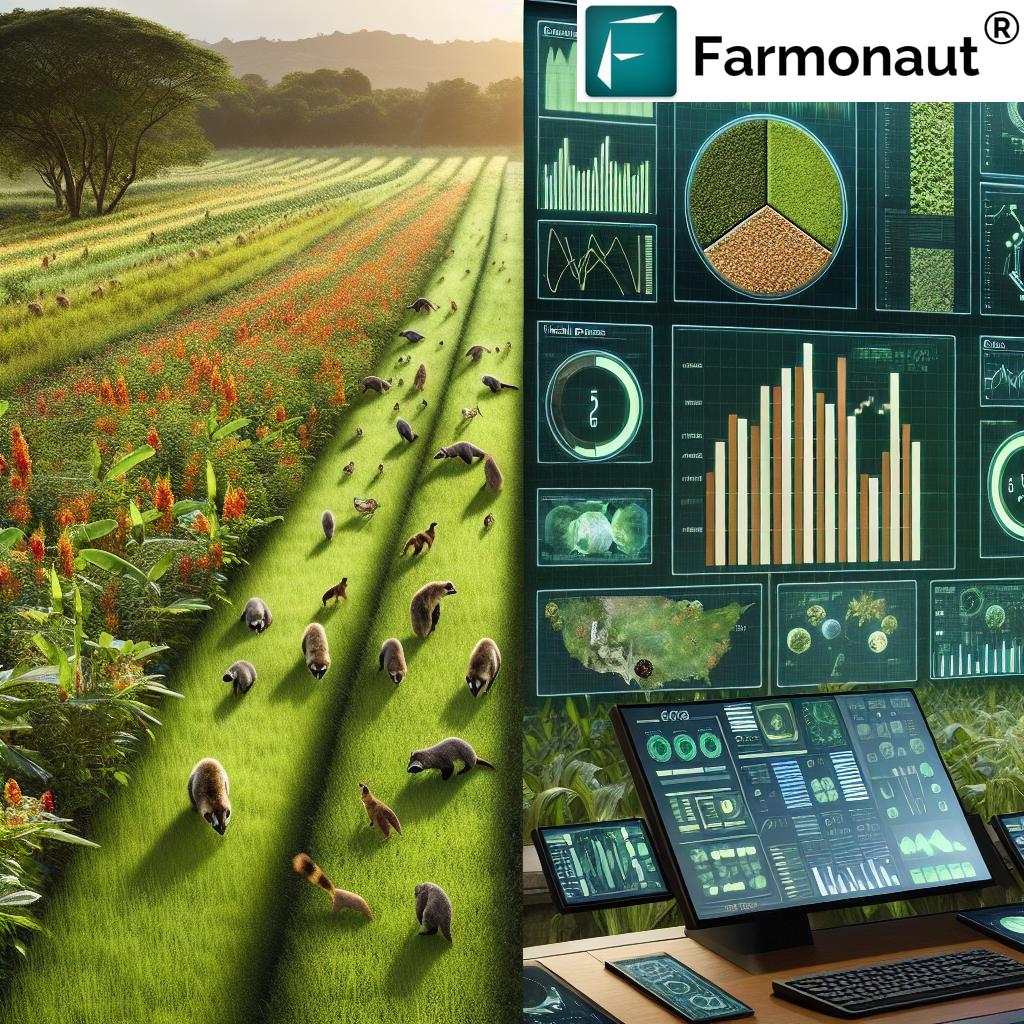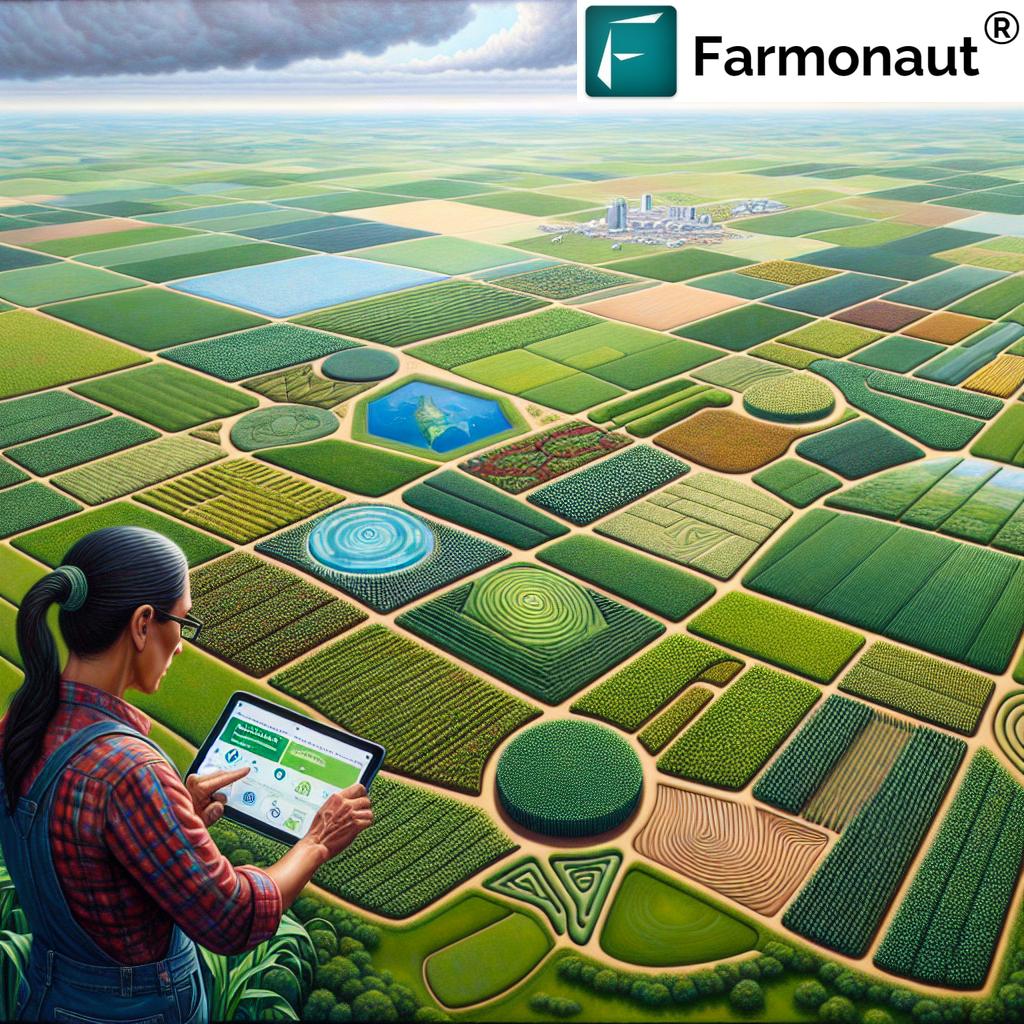Sustainable Agriculture in Madison: Balancing Pesticide Use for Food Security and Environmental Protection

“Integrated Pest Management (IPM) can reduce pesticide use by up to 50% while maintaining crop yields.”
In the heart of America’s Dairyland, Madison, Wisconsin, we find ourselves at the forefront of a crucial agricultural revolution. As we navigate the complexities of modern farming, our focus on sustainable agriculture practices has never been more critical. The balance between ensuring food security and protecting our environment is delicate, and nowhere is this more evident than in our approach to pesticide use.
At Farmonaut, we understand the challenges faced by farmers in Madison and beyond. Our mission is to make precision agriculture affordable and accessible, integrating innovative technology with traditional farming wisdom. As we delve into the intricacies of sustainable agriculture and responsible pesticide use, we’ll explore how our satellite-based farm management solutions are revolutionizing the way we approach crop yield optimization and environmental conservation.
The Role of Pesticides in Modern Agronomy
Pesticides have long been a cornerstone of modern agronomy, playing a vital role in protecting crops from pests, diseases, and weeds. In Madison, as in many agricultural regions, the judicious use of pesticides has contributed significantly to increased crop yields and food security. However, the environmental impact of farming practices, including pesticide use, has come under increasing scrutiny.
Let’s break down the key aspects of pesticide use in sustainable agriculture:
- Crop Protection: Pesticides help safeguard crops from a variety of threats, ensuring healthier plants and higher yields.
- Food Security: By reducing crop losses, pesticides contribute to a more stable and abundant food supply.
- Economic Benefits: For farmers in Madison and across Wisconsin, effective pest control translates to improved profitability and economic sustainability.
- Environmental Considerations: The potential impact on soil, water, and biodiversity necessitates a careful approach to pesticide application.
As we strive for sustainable agriculture practices, it’s crucial to find a balance between these factors. This is where innovative solutions, like those offered by Farmonaut, come into play.
Integrated Pest Management: A Sustainable Approach
Integrated Pest Management (IPM) represents a holistic approach to pest control that aligns perfectly with the principles of sustainable agriculture. This strategy combines various pest control methods to minimize environmental impact while maintaining crop health and yield. In Madison, many farmers are adopting IPM as a core component of their sustainable farming practices.
Key elements of IPM include:
- Monitoring: Regular field observations to assess pest populations and crop health.
- Prevention: Using resistant crop varieties and cultural practices to reduce pest pressure.
- Biological Control: Encouraging natural predators of pest species.
- Chemical Control: Using pesticides only when necessary and in targeted applications.
By implementing IPM strategies, farmers in Madison can significantly reduce their reliance on chemical pesticides while maintaining or even improving crop yields. This approach not only benefits the environment but also contributes to long-term soil health and agricultural sustainability.
Precision Agriculture: Optimizing Pesticide Use
Precision agriculture technology is revolutionizing the way we approach pesticide application in Madison and beyond. By leveraging data-driven insights and advanced monitoring techniques, farmers can apply pesticides more efficiently and effectively, reducing overall usage while maximizing crop protection.
“Precision agriculture techniques can decrease pesticide application rates by 30-40% compared to conventional methods.”
At Farmonaut, we’re at the forefront of this technological revolution. Our satellite-based crop health monitoring system provides farmers with real-time insights into their fields, allowing for targeted and timely interventions. Here’s how precision agriculture is transforming pesticide use:
- Targeted Application: Using satellite imagery and AI analysis, we can identify specific areas of pest infestation, allowing for localized treatment rather than blanket application.
- Optimal Timing: Our weather forecasting and crop health monitoring help determine the best times for pesticide application, maximizing effectiveness and minimizing runoff.
- Reduced Environmental Impact: By applying pesticides only where and when needed, we significantly decrease the amount of chemicals entering the ecosystem.
- Cost Savings: Precision application leads to reduced pesticide use, translating to lower input costs for farmers.
These advancements in precision agriculture are not just theoretical – they’re making a real difference in Madison’s farms today. By embracing these technologies, local farmers are taking significant strides towards more sustainable and environmentally friendly farming practices.
Explore Farmonaut’s API for advanced agricultural insights
Understanding Pesticide Categories and Their Impact
To make informed decisions about pesticide use in sustainable agriculture, it’s essential to understand the different categories of pesticides and their specific applications. Let’s break down the four main types of pesticides commonly used in Madison’s agricultural landscape:
| Pesticide Category | Primary Use | Benefits for Crop Yield | Environmental Considerations |
|---|---|---|---|
| Insecticides | Control insect pests | Up to 20% increase | Potential impact on beneficial insects |
| Herbicides | Manage weeds | 15-25% increase | Risk of herbicide resistance |
| Fungicides | Prevent fungal diseases | 10-15% increase | Low soil persistence |
| Rodenticides | Control rodent populations | 5-10% increase | Risk to non-target species |
| Integrated Pest Management | Holistic pest control | Maintains yield while reducing pesticide use | Minimal environmental impact |
Each category of pesticide plays a specific role in crop protection, but it’s crucial to consider their environmental impact. At Farmonaut, we advocate for a balanced approach that integrates these tools with sustainable practices and technology-driven solutions.
Climate-Smart Farming: Adapting to Environmental Challenges
As we face the realities of climate change, farmers in Madison are increasingly turning to climate-smart farming techniques. These practices not only help mitigate the effects of changing weather patterns but also contribute to more sustainable pesticide use. Here’s how climate-smart farming intersects with pest management:
- Crop Diversification: Growing a variety of crops can naturally reduce pest pressure and the need for pesticides.
- Cover Cropping: This practice improves soil health and can naturally suppress weed growth, reducing herbicide requirements.
- Water Management: Efficient irrigation systems can help create less favorable conditions for pests and diseases, decreasing the need for chemical interventions.
- Soil Health Focus: Healthy soils support stronger plants that are more resistant to pests and diseases.
At Farmonaut, our satellite-based monitoring systems and AI-driven insights help farmers implement these climate-smart practices more effectively. By providing real-time data on soil moisture, crop health, and weather patterns, we empower farmers to make informed decisions that balance pest control with environmental stewardship.
The Future of Sustainable Agriculture in Madison
As we look to the future of farming in Madison and beyond, the path towards sustainable agriculture is clear. It involves a delicate balance of traditional wisdom, cutting-edge technology, and a deep commitment to environmental stewardship. Here’s what we envision for the future of sustainable agriculture:
- Technology Integration: Increased adoption of precision agriculture tools, like Farmonaut’s satellite monitoring systems, will lead to more efficient and targeted pesticide use.
- Biological Alternatives: Development and wider use of biopesticides and other eco-friendly pest control methods.
- Data-Driven Decision Making: Leveraging big data and AI to predict pest outbreaks and optimize control strategies.
- Collaborative Research: Continued partnerships between farmers, scientists, and technology providers to develop innovative, sustainable solutions.
Check out our API Developer Docs for integrating Farmonaut’s technology

Balancing Food Security and Environmental Protection
The challenge of feeding a growing population while protecting our environment is one that requires innovative solutions and a commitment to sustainable practices. In Madison, we’re seeing firsthand how farmers are rising to this challenge, embracing new technologies and methods to optimize their use of pesticides and other resources.
Key strategies for balancing food security and environmental protection include:
- Precision Application: Using technology to apply pesticides only where and when needed, reducing overall use.
- Integrated Pest Management: Adopting holistic approaches that minimize chemical interventions.
- Soil Health Focus: Prioritizing soil conservation and health to naturally boost crop resilience.
- Water Management: Implementing efficient irrigation systems to reduce water waste and pest-favorable conditions.
- Biodiversity Promotion: Encouraging natural pest control through habitat preservation and crop diversification.
At Farmonaut, we’re proud to be part of this sustainable agriculture revolution. Our technologies empower farmers to make data-driven decisions that benefit both their crops and the environment.
The Role of Policy and Education in Sustainable Agriculture
Achieving a balance between pesticide use, food security, and environmental protection isn’t just about technology and farming practices. It also requires supportive policies and ongoing education. In Madison, we’re seeing positive steps in this direction:
- Policy Support: Local and state policies that incentivize sustainable farming practices and responsible pesticide use.
- Farmer Education: Ongoing training programs to help farmers adopt new technologies and sustainable methods.
- Consumer Awareness: Initiatives to educate consumers about the importance of sustainable agriculture and its impact on food quality and the environment.
- Research Funding: Continued investment in agricultural research to develop more sustainable pest control methods.
These efforts, combined with technological advancements like those provided by Farmonaut, are creating a more sustainable and resilient agricultural system in Madison and beyond.
Conclusion: A Sustainable Future for Madison’s Agriculture
As we’ve explored throughout this article, the path to sustainable agriculture in Madison involves a careful balance of innovative technology, responsible practices, and a commitment to environmental stewardship. By embracing precision agriculture technologies, implementing integrated pest management strategies, and adopting climate-smart farming techniques, Madison’s farmers are leading the way towards a more sustainable and productive agricultural future.
At Farmonaut, we’re excited to be part of this journey, providing cutting-edge tools and insights that help farmers optimize their operations while minimizing environmental impact. Our satellite-based monitoring systems, AI-driven advisory services, and commitment to accessibility are empowering farmers to make data-driven decisions that benefit both their crops and the planet.
As we look to the future, the challenges of food security and environmental protection will continue to evolve. However, with continued innovation, collaboration, and a shared commitment to sustainability, we’re confident that Madison’s agricultural community will rise to meet these challenges head-on.
Together, we can create a future where abundant harvests and environmental health go hand in hand, ensuring a thriving agricultural sector for generations to come.
FAQ: Sustainable Agriculture and Pesticide Use in Madison
Q: What is sustainable agriculture?
A: Sustainable agriculture refers to farming practices that meet current food needs while preserving the ability of future generations to meet their own needs. It involves methods that protect the environment, public health, and animal welfare while maintaining economic viability.
Q: How does precision agriculture contribute to sustainability?
A: Precision agriculture uses technology like satellite imaging and AI to optimize resource use. This leads to more targeted pesticide application, reduced water usage, and overall more efficient farming practices, minimizing environmental impact.
Q: What are the main challenges in reducing pesticide use?
A: The main challenges include maintaining crop yields, managing pest resistance, balancing cost-effectiveness, and ensuring food security. It also requires significant education and adaptation of farming practices.
Q: How can farmers in Madison get started with sustainable agriculture practices?
A: Farmers can start by implementing integrated pest management, exploring precision agriculture technologies like Farmonaut’s solutions, participating in local agricultural extension programs, and gradually adopting climate-smart farming techniques.
Q: What role does technology play in sustainable agriculture?
A: Technology plays a crucial role by providing data-driven insights for decision-making, enabling precise resource application, monitoring crop health in real-time, and facilitating more efficient farm management practices.



















